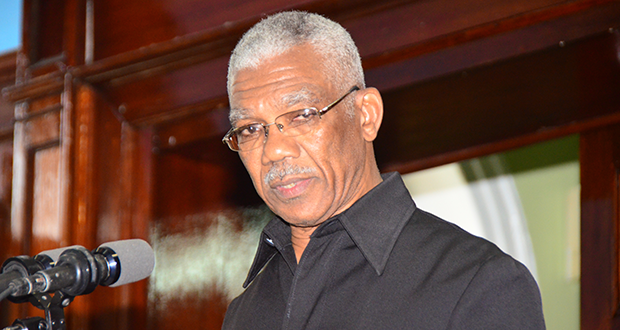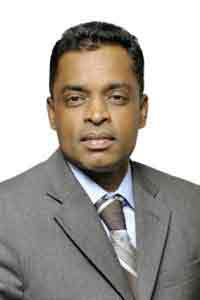Reported halt in rice trade with Venezuela … RPA stands by Gov’t – to work in best interest of rice farmers
WITH neighbouring Venezuela reportedly halting rice shipments from Guyana, head of the Rice Producers Association (RPA), Mr Dharamkumar Seeraj, has said the largest organisation representing rice farmers is ready and willing to work with the Administration to minimise the impact of this loss.
The action by the Spanish-speaking nation to the west came amidst intensification of its claim over Essequibo, a move Guyana has strongly protested.
The Bolivarian Republic has been more vocal in its claim since U.S. Company Esso Exploration announced the discovery of oil in the Liza-1 well on the Stabroek Block, approximately 120 miles offshore Guyana, a few months ago.
The Chronicle, yesterday, made several unsuccessful attempts to contact Agriculture Minister Noel Holder for a comment on the reported action of Venezuela and suggestions on the way forward.
However, according to a report in another daily, the Minister has confirmed Venezuela’s pull out of the rice-for-oil deal with Guyana.
Seeraj told this publication that, if indeed the reports are true, the action by Venezuela can be best described as premature. He said Guyana should explore its legal options, which are clearly spelt out in the agreement with Venezuela. He also said that, in light of what has been reported, it would be important for Guyana to seek clarity on the matter.
Seeraj, part of the former Government’s team that negotiated the rice deal with the Venezuelans, suggested that it could probably be a case of Venezuela asking Guyana to hold on export until it is ready for another shipment of rice from Guyana. This, he said, is quite different from Caracas issuing a frank order to stop all imports from Guyana.
Nevertheless, he said a loss of the lucrative Venezuelan market will be a big blow to the local rice industry, and would mean that the Government would have to redouble efforts to find new markets for farmers.
Rice production has been growing to record levels in recent years, but there have been complaints from millers and farmers about inadequate market to off-take the high level of production. In light of these complaints, the previous administration had begun looking beyond traditional markets to sell the produce. It was hoping to secure markets in Africa, with the hope that these will grow and expand as time goes by.
Seeraj said it would be important for the Government to probably pick up where the former Government has left off, so as to ease the pressure on the industry.
Former Agriculture Minister Dr Leslie Ramsammy had said that Guyana cannot forever rely on Venezuela to buy its rice.
URUGUAY DEAL
On April 20, the PanAm Post, which provides news and analyses in the Americas, reported that Uruguay has offered to give Venezuela food in exchange for oil, after Vice President Raúl Sendic had met in Montevideo with his Venezuelan counterpart, Jorge Arreaza.
According to the report, Sendic explained that Uruguay has to “establish a permanent flow of trade and exports” with Venezuela, because “there’s little availability of money in this country.”
As a result, the report said, Montevideo is to offer exports of rice, dairy products and chicken in exchange for Venezuelan petroleum.
A press release from the Uruguayan Presidency said both Vice Presidents have agreed to apply “a programme of commercial and energy issues to advance in bilateral negotiations.”
Guyana produces in excess of 600,000 tonnes of rice annually, 34 per cent of which is exported to Venezuela at a premium price.
Given the size of the export, a loss of the Venezuelan market could cause a contraction in production, seriously affecting rice farmers and millers.
SUPPORT
Seeraj told the Chronicle that the issues affecting the rice industry are of concern to the RPA, and he is prepared to work with the Government in the best interest of rice farmers.
Venezuela has been pushing hard to add credence to its claim of ownership of the Essequibo, which accounts for two-thirds of Guyana’s land mass. ‘El Universal’, a Venezuelan newspaper, reported on Friday that the Government of Venezuela will, in the upcoming days, launch a diplomatic strategy to recover the territory of the Essequibo, ownership of which it is disputing with Guyana. This announcement was made by retired colonel Pompeyo Torrealba Rivero, who advises President NicolÁs Maduro in this matter.
Torrealba coordinates the Office for the Rescue of the Essequibo, created by the Venezuelan Government to lay its claim to ownership of the Essequibo. He informed that President Maduro has ordered the teaching of this matter of the Essequibo as a subject in universities and elementary and high schools, and also in media located in bordering areas.
He has also reportedly proposed to issue identity cards for the estimated 200,000 inhabitants of the Essequibo, and to start an awareness campaign to make the population of Guyana understand that Essequibo belongs to Venezuela.
These developments have come in light of the decrees issued by President Nicolas Maduro (illegally) claiming a vast area of Guyana’s territory.
President David Granger has said that while the new decree, Number 1859, does not contain the coordinates of the decree Number 1787, it does contain a general description of all defence zones, with the description of the eastern, central, and western regions remaining consistent with previous versions of the new decree.
THREAT OF FORCE
In an address to the National Assembly on Thursday last, President Granger denounced Venezuela’s description of Guyana’s maritime boundaries as “Integral Maritime Defence Zones” in the new decree. He noted that “there continues to be a threat of force in these areas.”
In rejecting Venezuela’s claim to Guyana’s waters as defence zones, President Granger contended that the decree “goes on further to state that these defence zones are spaces created to plan and execute integral defence operations.”
“We consider decree 1787 as constituting an act of aggression against Guyana,” President Granger noted. The Head of State recalled his recent trip to Barbados for the 36th CARICOM Heads of Government meeting, and a recent visit to Guyana, where Commonwealth Secretary General Kamalesh Sharma expressed solidarity with Guyana from the 53-nation Commonwealth.
“The matter is to be discussed at the Commonwealth Foreign Ministers Meeting in New York in September,” President Granger continued. During the CARICOM Summit in Barbados, the President met with United Nations Secretary General Ban Ki-Moon who “committed to sending a mission to both Venezuela and Guyana.” The President expressed his willingness to accept that group delegated by the UN Secretary General.
“The decree, of course, violates the word and spirit of the 1966 Geneva Agreement that forbids the claiming of new territory while the agreement remained enforced,” President Granger maintained.
He further explained in the words of Article 5, “no new claim or enlargement of an existing claim to territorial sovereignty in those territories shall be asserted while this agreement is in force, nor shall any claim whatsoever be asserted otherwise than in the mixed commission, while that commission is in being.”
The Guyana-Venezuela issue has been like a sleeping volcano spanning across decades, but Venezuela’s new claims, according to President Granger, goes far beyond the previous claims of Essequibo and its maritime boundaries and now extends to the maritime space of Demerara, and even part of Suriname’s maritime space.
MISPLACED AGGRESSION
Former Region 10 Chairman Sharma Solomon, in a statement, also added his voice to the developments following the aggression shown by Venezuela.
He said Venezuela’s claim of what is not hers is an act of misplaced aggression.
“To continue to want to grab what has been settled by international arbitration is a show of contempt for the rule of law. To decide on one day you will use this decree and next day use another in efforts to push an agenda which is known to have no moral and international premise and support among right-thinking persons within your country is a sign of desperation. All 83,000 square miles and the Exclusive Economic Zone (EEZ) prescribed by the United Nations Convention on the Law of the Sea in relation to Guyana remain ours!” he said.
The former Region 10 Chairman contended that President Maduro’s failure to provide basic amenities for the citizens of Venezuela has angered his people, resulting in a series of protest action and widespread discontent.
“The President’s failure to properly address domestic affairs has seen him turning his personal aggression against Guyana and other sovereign nations.
The intention of President Maduro’s act is to rally the citizens of Venezuela against Guyana and others with a view of diverting attention from his failed economic policies,” Solomon contends.
By Tajeram Mohabir



